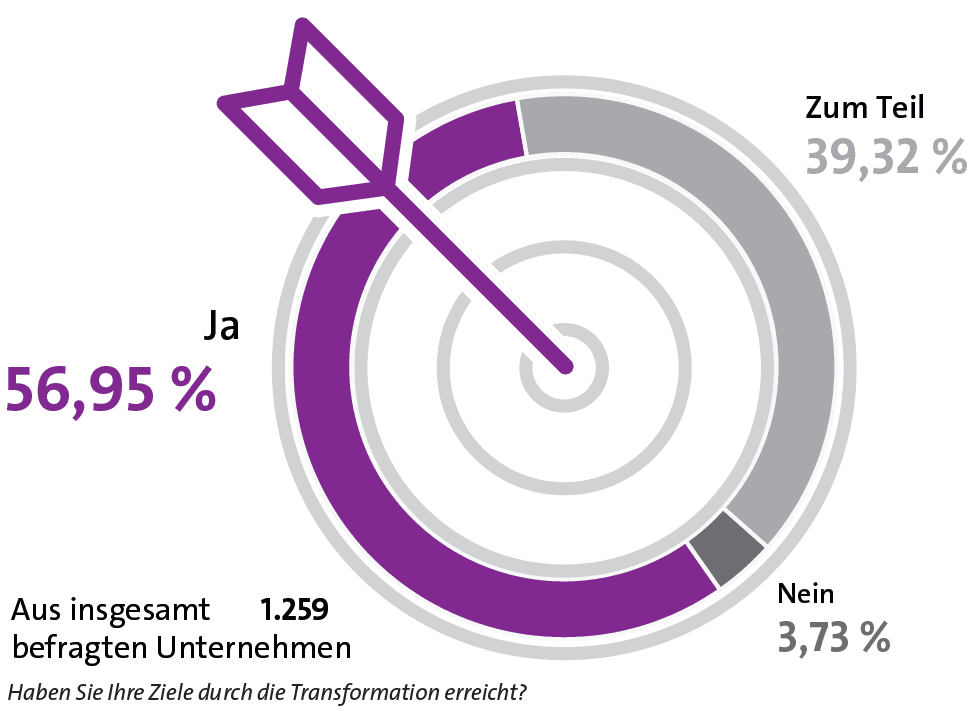The best way for a successful IT transformation


The results of an IT transformation process - for example to SAP S/4 Hana - can be disappointing, at least in part. Transformation experts who support digital relocations at corporations such as Volkswagen, BMW or public institutions not only gain experience in these lighthouse projects, but can also expand their experience in other transformations. Natuvion and NTT Data Business Solutions even go one step further and have once again conducted their annual transformation study.
In the study, more than 1,200 top managers and department heads in fifteen countries were asked how they have managed their transformation over the past two years. The aim is to obtain well-founded insights into the transformation practices of companies and to derive developments and trends that will also help others with their transformation projects. There are many reasons for a transformation - for example, the quasi-obligation to migrate from older SAP systems to S/4 Hana. However, this is by no means the only reason, as the results of the study show. Similar to last year's study, a broad range of objectives is also evident in 2024.
Organizational tasks
The most common reason for an IT transformation is an organizational adjustment at 36%, followed by the introduction of new technologies (e.g. AI) at around 27%. Third place is shared by the purchase and sale of companies or parts of companies (26.3%). This is followed by the introduction of new business models (26.2%) and increasing innovative capacity (25.9%). Within the evaluations, the sectors with a high need for adaptation show conspicuously high values when it comes to organizational adjustments. The automotive industry, for example, cites the highest value for organizational adjustments at 48% - which is presumably due to the transition to electromobility. Similar results were seen in the life sciences sector, where organizational adjustments also ranked first with 48%. The introduction of new, modern technologies took first place in the financial industry with 46%, followed by cost reduction with 39%.

It is interesting to look at the results for the individual countries. As in the 2023 study, cost reduction is in third place in the DACH region in 2024 with 35%, almost on a par with the introduction of new, modern technologies. In the Nordics (Sweden, Denmark, Finland and Norway), cost reduction is the second most frequently cited reason for transformation at around 26% and in the UK at 24%. In the USA, on the other hand, increasing innovative capacity is in first place with 49%, closely followed by the purchase, sale or merger of companies or parts of companies.
Modernization underestimated
One of the key questions relates to the goals set for the transformation and whether these have been achieved. The result confirms that respondents often underestimate the modernization of their IT systems. From an international perspective, only just over half (57%) of respondents confirmed that they had achieved the defined goals.
The Nordic countries and France lead the way with a target achievement rate of just over 62%. In DACH, target achievement is slightly below the international average at 55%. It is striking that those who rated analysis and a well-founded inventory as a critical success factor of their transformation more highly also state more often that they have achieved all of their goals.

Transformation study classics: poor data quality and a lack of expertise! There are various aspects that lead to a successful or less satisfactory transformation. One classic that has been a recurring theme in all studies since 2022 is poor data quality coupled with a lack of transformation expertise. The answer to the question about the most common stumbling blocks during transformation is therefore hardly surprising. The lack of data quality ranks first in the international results. Just under 45% attach crucial importance to improving data quality. In Germany, this figure is even ten percent higher at 55 percent. It therefore seems only logical that stocktaking is very high up in the rankings when it comes to the question of the most important technical measure, with over 34% in third place. According to the study results, another obstacle on the path to transformation is the lack of transformation expertise in companies. This seems hardly surprising, as system migrations such as to S/4 are not part of daily business, even in large companies. Across all countries, the lack of transformation expertise is almost universally cited as a major challenge: 34% cited the lack of experience of their own employees with projects of this size as the biggest surprise.
Know-how of those involved
The framework conditions and challenges of a transformation are very different. Nevertheless, the transformation study confirms that the lack of competent employees is a far more serious problem than assumed. It is also interesting to note that the time, resources and costs involved are still underestimated.
The task of transformation experts will therefore continue to be to provide intensive information about the challenges and best practices. In the new transformation study, Natuvion and NTT Data Business Solutions have asked granular questions about all aspects of a transformation - including motivation, the decision-making process, preparation, implementation, experience and future requirements. The results of this study and the experiences of more than 1,200 managers are an enormously important aid for all companies undergoing or planning a transformation.
To the partner entries:







